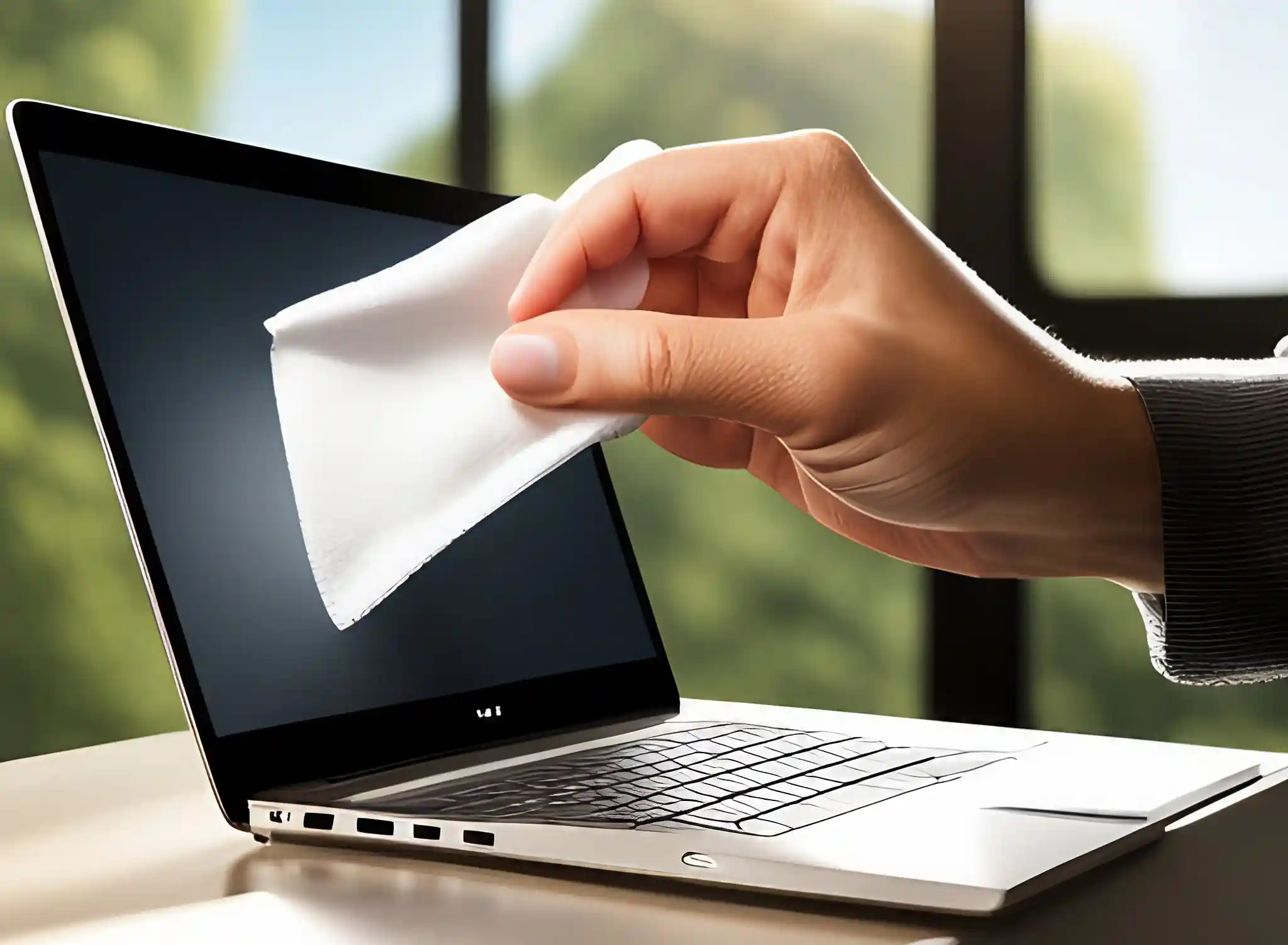- Keep Your Screen Crystal Clear: How to Best Clean Laptop Screen
- From Fingerprints to Dust: The Best Ways to Clean Your Laptop Screen
Frequently, we catch ourselves staring at our laptop screens, obscured by a haze of fingerprints and smudges. In this article, we present you with the most effective methods to restore your laptop screen to its pristine glory.
- Understanding and Cleaning Different Types of LCD Screens
- Tips and Tricks for Maintaining a Clean Laptop Screen
- What You’ll Need
- What To Avoid
- How to Clean a Laptop Screen
- FAQs
- Can I Use Alcohol Wipes to Clean My Laptop Screen?
- Is It OK To Clean The Laptop Screen With Water?
- Is It OK To Use Windex On A Laptop Screen?
- What Should I Do If My Laptop Screen Gets Scratched?
- Are Lens Wipes Safe For Computer Screens?
- What Household Product Can I Use To Clean My Computer Screen?
- Alternative Methods For Cleaning A Laptop Screen
- Which Are The Best Laptop Cleaners To Use?
- Additional Tips for Maintaining a Clean Laptop Screen
- Conclusion
- Shop This Article:
- References
THIS POST MAY CONTAIN AFFILIATE LINKS. As an Amazon Associate, I earn from qualifying purchases. PLEASE READ MY DISCLOSURE FOR MORE INFO.
Understanding and Cleaning Different Types of LCD Screens
LCD screens can have various top layers, such as glass, plastic, coating, or protective bezels. Each type is unique, which means that different cleaning methods should be applied to each one. Therefore, it is important to understand that each type of screen requires a specific cleaning approach.
Here’s a quick guide to help you understand and clean different types of LCD screens:
| Type of LCD Screen Layer | Recommended Cleaning Method |
|---|---|
| Glass | Dampen cloth with distilled water or glass cleaner, then wipe in a circular motion. |
| Plastic | Use mild dish soap diluted with distilled water for cleaning. Rinse with a damp cloth and let dry. |
| Coating | Use a soft, lint-free cloth with distilled water and mild detergent solution to gently wipe the screen. Avoid scrubbing or using harsh chemicals. |
| Protective Bezels | Wipe with a damp cloth or use compressed air to remove dust and debris from crevices. Avoid cleaning solutions as they can damage the bezel’s finish. |
Related: Laptop Display Showdown: Matte versus Glossy Screens
Tips and Tricks for Maintaining a Clean Laptop Screen
- Regularly cleaning your laptop screen can help prevent buildup and damage.
- Always use a soft, lint-free cloth to avoid scratching the screen.
- Avoid using harsh chemicals or rough materials when cleaning your screen.
- Consider investing in a screen protector to reduce fingerprints and smudges on your screen.
- If your screen is heavily soiled, you can use a commercial cleaning solution specifically designed for laptop screens.
- Avoid touching the screen with your fingers to minimize fingerprints and smudges.
- Always follow the manufacturer’s instructions when cleaning your specific laptop model.
By following these tips and techniques, you can ensure that your laptop screen remains crystal clear and in top condition.
What You’ll Need
According to experts, to clean your laptop screen effectively, you’ll need a few specific items:
- A soft, lint-free cloth: Microfiber cloths(Amazon Link) are ideal for this purpose. They are soft, absorbent, and won’t scratch your screen.
- Distilled water: Unlike tap water, distilled water doesn’t contain minerals that can leave residue on your screen.
- White vinegar: This household staple is a gentle, natural cleaner that can help remove stubborn smudges and dirt.
- Mild dish soap (for plastic screens): A small amount of mild dish soap diluted with distilled water can be used for cleaning plastic screens.
- Compressed air (for protective bezels): Compressed air (Amazon Link) can be used to blow dust and debris out of small crevices in the bezels around your screen.
Remember, it’s important to avoid using harsh chemicals, rough materials, or overly wet cloths when cleaning your screen, as these can cause damage. Always turn off your laptop and disconnect it from the power source before you start cleaning to ensure safety.
What To Avoid
When it comes to cleaning your laptop screen, there are certain items that experts strongly advise against using due to the potential risk of damage. Here’s a list of things to avoid:
- Harsh Chemicals: Cleaning agents like acetone, ammonia, or ethyl alcohol are too strong for the sensitive surface of your laptop screen and can cause irreparable damage.
- Rough Materials: Avoid using paper towels, old rags, sponges, or any other rough material that might scratch the screen’s surface.
- Excessive Liquid: Never spray your cleaning solution directly onto the screen. Excess liquid can seep into the edges of the screen, damaging the display or other internal components.
- Direct Contact with Fingers: Try to avoid touching the screen with your fingers. Not only do fingerprints smudge the screen, but the oil from your skin can also cause damage over time.
By avoiding these items, you can ensure the longevity of your laptop screen and maintain its clarity and functionality.

How to Clean a Laptop Screen
Step 1: Turn Off Your Laptop
Before cleaning your laptop screen, make sure to turn off the device and disconnect it from any power source. This will prevent any potential damage or electric shock.
Step 2: Gather Your Supplies
As mentioned earlier, you’ll need a soft, lint-free cloth, distilled water, white vinegar (optional), mild dish soap (for plastic screens), and compressed air (for protective bezels).
Step 3: Dust Off the Screen
Using a soft, dry cloth, gently wipe away any dust or debris from your screen. Be sure to use light pressure and avoid pressing too hard, as this can cause scratches.
Step 4: Moisten Your Cloth
If there are stubborn marks or smudges on your screen, dampen your cloth with a mixture of distilled water and white vinegar (or mild dish soap for plastic screens).
Step 5: Wipe in Circular Motions
Gently wipe the screen in circular motions, being careful not to press too hard or use excessive force. Continue until all marks have been removed.
Step 6: Dry With a Clean Cloth
Once you’ve cleaned the screen, use a clean, dry cloth to remove any excess moisture. This will help prevent water spots or streaks from forming.
Step 7: Clean the Bezel
If your laptop has a protective bezel (the frame surrounding the screen), use compressed air to blow out any dust and debris from small crevices.
Are These Steps Applicable to All Laptop Screens, Including LCD or LED?
The cleaning instructions provided above are generally applicable to all types of laptop screens, including both LCD (Liquid Crystal Display) and LED (Light Emitting Diodes) screens. However, it is critical to note that these screens can be delicate and require careful handling, and the cleaning process should be approached with a certain level of caution.
While the composition of LCD and LED screens may differ, they both employ a similar surface which is susceptible to scratches, smudges, and other forms of damage. Therefore, the use of a soft, lint-free cloth and the avoidance of harsh chemicals remain universally advisable across these screens.
Furthermore, the manufacturer’s instructions should always be followed. Some manufacturers may recommend specific cleaning solutions or procedures tailored to their product’s screen type. Therefore, it is best to consult your device’s user manual or the manufacturer’s website for specific care instructions before proceeding with the cleaning process.
Screen Issues: Troubleshooting Guide: Why is My Lenovo Laptop Screen Not Turning On and How to Fix It
FAQs
Can I Use Alcohol Wipes to Clean My Laptop Screen?
Although alcohol wipes may seem like a convenient and effective option for cleaning your laptop screen, they are not recommended.
This is because most alcohol-based cleaners contain harsh chemicals that can damage the surface of your screen.
Additionally, these wipes are usually too wet, which increases the risk of liquid seeping into the edges of the screen and causing damage to internal components.
Is It OK To Clean The Laptop Screen With Water?
Yes, it is generally safe to clean your laptop screen with water, as long as you use distilled water and follow the proper steps.
Using tap water can leave mineral residue on your screen, which can be difficult to remove and may cause damage over time.
Additionally, always remember to turn off and unplug your laptop before cleaning the screen to ensure safety.
Is It OK To Use Windex On A Laptop Screen?
No, it is not recommended to use Windex or any other glass cleaner on your laptop screen. These cleaners contain harsh chemicals and can cause damage to the delicate surface of your screen.
It’s best to stick with a gentle cleaning solution made specifically for electronics or opt for distilled water mixed with white vinegar as an alternative.
What Should I Do If My Laptop Screen Gets Scratched?
If your laptop screen gets scratched, it’s important to act quickly.
First, stop using the device and turn it off to prevent further damage.
Next, assess the severity of the scratch – if it is a minor scratch, you can try using a microfiber cloth or screen cleaner designed for scratches.
For more severe scratches or cracks, it’s best to consult a professional for repairs. Attempting to fix it yourself may cause further damage and void any warranty on your device.
Remember, prevention is always better than cure – taking proper care of your laptop screen can help avoid scratches and prolong its lifespan.
Are Lens Wipes Safe For Computer Screens?
Lens wipes are not recommended for cleaning computer screens. While they may be gentle enough for camera lenses or eyeglasses, it’s best to avoid using them on electronic devices.
These wipes often contain alcohol and other chemicals that can damage the surface of your laptop screen.
Stick with a soft, lint-free cloth and gently wipe in circular motions to clean your screen effectively.
What Household Product Can I Use To Clean My Computer Screen?
There are a few household items that can be used to clean your computer screen safely and effectively.
Distilled water mixed with white vinegar is a popular DIY cleaning solution, as it is gentle yet effective in removing smudges and marks from screens.
Isopropyl alcohol (70% or less) can also be used sparingly on a soft cloth to remove stubborn marks.
However, it’s always best to test these solutions on a small, inconspicuous area first before applying them to the entire screen.
Alternative Methods For Cleaning A Laptop Screen
While the above steps are generally considered safe and effective for cleaning a laptop screen, there are a few alternative methods that some people may prefer.
Some individuals opt to use electronic-safe wipes or sprays specifically designed for cleaning screens.
Others choose to invest in a microfiber cloth specifically made for electronics, as they are designed to be gentle on delicate surfaces.
Whichever method you choose, remember to always approach the cleaning process with caution and follow the manufacturer’s instructions for your specific device.
Which Are The Best Laptop Cleaners To Use?
There are many laptop cleaners available on the market, and it can be overwhelming to choose one.
When selecting a laptop cleaner, look for gentle formulas that are free of harsh chemicals and safe for electronic devices.
Some popular options include screen cleaning sprays or kits specifically designed for laptops, electronic-safe wipes, or distilled water mixed with white vinegar.
Ultimately, the best cleaner for you will depend on your personal preferences and the level of care recommended by your laptop’s manufacturer.
Additional Tips for Maintaining a Clean Laptop Screen
- Avoid eating or drinking near your laptop to prevent spills and stains on the screen.
- Use a keyboard cover or compressed air to keep debris from falling between the keys and onto the screen.
- Avoid touching your screen with sharp objects or dirty fingers to prevent scratches and smudges.
- If you notice any damage or buildup on your laptop screen, consult a professional for safe and effective cleaning methods.
Now that you have learned the top methods for cleaning your laptop screen, put them into practice to keep your screen looking like new.
Conclusion
Keeping your laptop screen clean is essential for not only maintaining its appearance but also prolonging its lifespan.
Remember to always use gentle cleaning solutions, avoid harsh chemicals, and follow the manufacturer’s instructions for your specific device.
By following these tips and incorporating them into your regular maintenance routine, you can keep your laptop screen looking like new for years to come. Overall, taking proper care of your laptop screen doesn’t have to be complicated or time-consuming – it’s just a matter of using the right techniques and having patience.
To summarize:
- Avoid using alcohol wipes or glass cleaners on your laptop screen
- Clean with distilled water or electronic-safe wipes instead
- Be cautious with household products and always test on a small area first
- Consider investing in a microfiber cloth designed for electronics
By following these tips, you can keep your laptop screen clean and clear without risking damage to your device.
Shop This Article:
We’ve discussed several items throughout this article that could help you maintain a clean laptop screen. These are Amazon links and include:
- Microfiber cloths: These are designed specifically for gentle cleaning of electronic devices, including laptop screens.
- Compressed air: This can help remove debris from between the keys and off the screen without causing damage.
- Electronic-safe wipes: These are specially designed wipes for screens that can help you clean efficiently without damaging your screen.
- Laptop cleaning kits: These convenient kits usually come with a cleaning solution and a microfiber cloth, providing all you need for a comprehensive cleaning.
Remember to choose products that suit your specific needs and follow the manufacturer’s instructions carefully.
References
Throughout the process of compiling these tips and recommendations, we utilized the following online sources to ensure the accuracy and reliability of our information:
- IGN: How to Clean a Laptop Screen – This resource provided insights into different methods for cleaning a laptop screen, highlighting the importance of gentle cleaning products and techniques.
- Lenovo: How to Clean Laptop Screen – This detailed guide from Lenovo, one of the leading manufacturers of laptops, was invaluable. It provided comprehensive advice on maintaining a clean laptop screen and steps to minimize potential damage.
- Clorox: How to Clean and Disinfect Laptop Screen and Keyboard – This article offered advice from a trusted household brand on how to effectively clean and disinfect screens and keyboards.

J.S. is the owner, content creator, and editor at Upgrades-and-Options.com. I’ve worked in the IT and Computer Support field for over 20 years. The server hardware in my computer labs has mostly been IBM, but I’ve supported Dell, HP, and various other hardware. In addition, as part of my lab administrator responsibilities, I’ve learned, supported, and repaired/upgraded network hardware such as Cisco routers and switches. READ FULL BIO >>





